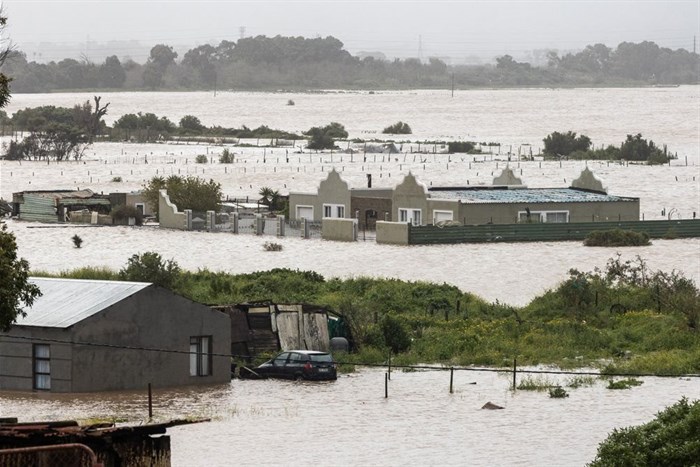
During the Heritage Day long weekend, a cut-off low pressure system unleashed torrential rainfall and fierce winds upon the Western Cape. More than 10 people died. Some towns and farms were isolated. Families had to be evacuated from their homes. Major roads became impassable as bridges collapsed.
A question on many people’s minds is no doubt: was human-caused climate change responsible for the severity of this September storm?
The term “cut-off low” may sound uncommon, but these weather phenomena are a defining element of South Africa’s weather systems. As this University of Pretoria article explains, they make an important contribution to South Africa’s average annual rainfall.
Cut-off lows are low pressure systems which have been “cut-off” from main atmospheric circulation. As a result, they linger in one area for an extended period. This persistence can lead to severe weather, which can cause flooding.
In the Western Cape, cut-off lows occur on average 10 times a year and are most dominant in autumn and spring, contributing to filling dams in anticipation of the long, dry summer months that lie ahead.
Cut-off lows can have varying degrees of impact, and do not usually cause the kind of destruction seen in the Western Cape last week.
Delving into the world of academic literature, including the Intergovernmental Panel on Climate Change (IPCC)’s Annual Reports, alongside interviews with esteemed university professors, a resounding message emerges: climate change does, and will continue to, intensify the frequency and severity of extreme events. But attributing a single weather event to climate change requires data collected over decades before we can reach a definitive connection.
According to Professor Jennifer Fitchett at the University of the Witwatersrand, while climate scientists usually do not link single weather events to climate change, there is an emerging field called attribution studies. These employ climate models under pre-industrial atmospheric conditions to gauge the likelihood of a particular weather event happening without the influence of climate change.
Fitchett cautions that it is important to remember that a once-off ‘experience’, without adequate data and modelling expertise, cannot immediately be ascribed to climate change. Until such a study has been done, it’s near impossible to say with any degree of certainty that this event was caused by climate change.
While it may take months to years for scientists to conclude whether the most recent Western Cape floods can be attributed to climate change, the IPCC’s latest Annual Report (AR6) has established that human-induced global warming will increase the likelihood and intensity of extreme events. In its latest AR6 report the IPCC expects the frequency and intensity of storms almost everywhere in Africa to increase.
The Western Cape Government has stated that the province is one of the most vulnerable to climate change in South Africa. The weather is becoming more variable because of climate change.
For coastal provinces, like the Western Cape, rising sea levels coupled with heavy rainfall events will increase the likelihood of storm surges and coastal flooding. Also, factors such as rising sea surface temperatures and increased atmospheric moisture will contribute to the formation of cut-off low-pressure systems, such as the one responsible for last week’s storm.
This article was originally published on GroundUp.
© 2023 GroundUp. This article is licensed under a Creative Commons Attribution-NoDerivatives 4.0 International License.

GroundUp is a community news organisation that focuses on social justice stories in vulnerable communities. We want our stories to make a difference.
Go to: http://www.groundup.org.za/